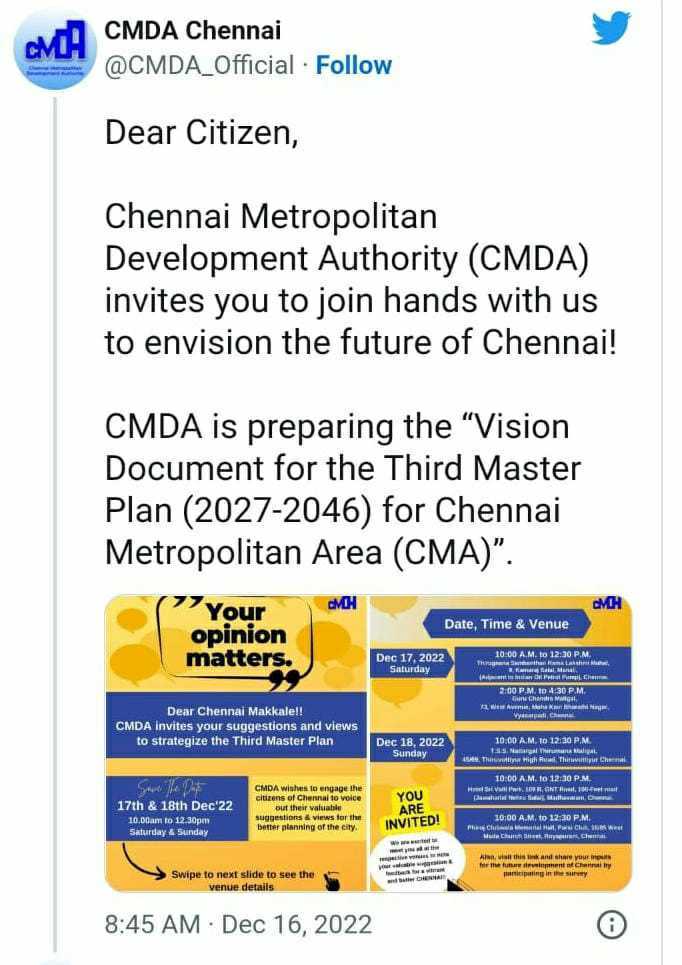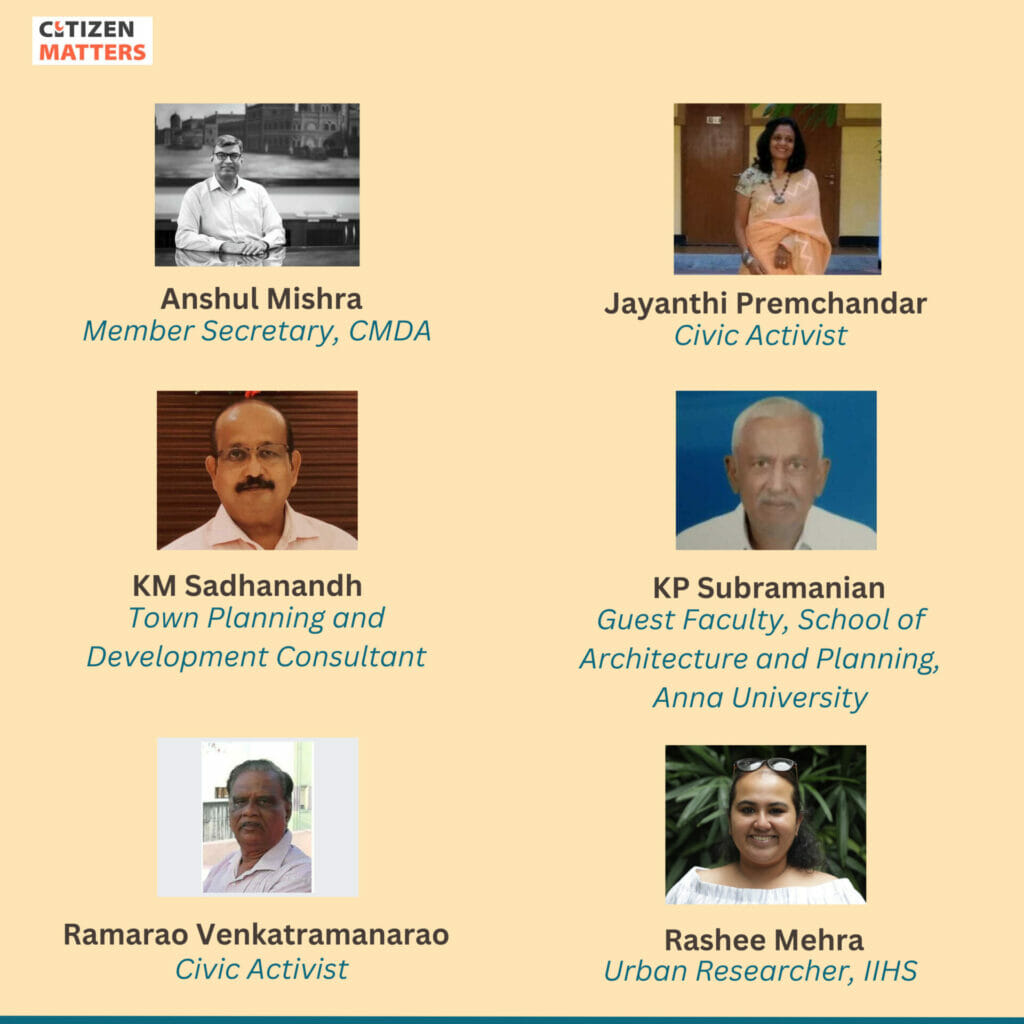One of the main functions of the Chennai Metropolitan Development Authority (CMDA) is to prepare the Master Plan for the Chennai Metropolitan Area (CMA) that extends over 1189 sq. km. and comprises Chennai Corporation, 8 Municipalities, 11 Town Panchayats and 179 villages covered in 10 Panchayats Unions.
The CMDA has now started the preparatory works for the Third Master Plan which is likely to be notified by December 2025 or April 2026. As part of the preparation of the 20-year (2026 to 2046) vision document for the Third Master Plan for Chennai, the CMDA has been conducting visioning workshops and public consultations.
Combating floods, urbanisation, traffic disruptions and other problems pertaining to the city are some of the issues that are to be looked into while preparing the GIS-based Third Master Plan, said Chief Minister MK Stalin in December 2021. Following the reports on sea level rise, the focus will also be on disaster management.
The vision document will be prepared by LEA Associates South Asia Pvt Ltd, an operating company of the LEA Group, Canada, in a joint venture with L&T Infrastructure Engineering.
Meanwhile, Chennai residents have many concerns. Those who attended the public consultation felt that they were not given enough space to share their thoughts. They also pointed out that there were many items from the Second Master Plan, including road widening works in many areas, that remained incomplete.
To discuss issues with the Second Master Plan, what the public expectations for the upcoming master plan are, and how the officials plan to address the concerns and demands raised by the residents and experts, Citizen Matters Chennai has organised an online panel discussion titled, “Will Chennai’s Third Master Plan meet people’s expectations?”
Read more: How blue areas become grey: Reclassification of waterbodies in Chennai
Where and when
The webinar will be held on Friday, January 27th from 6 pm. The panel discussion will be followed by a brief Q&A session open to all attendees.
You can register to participate in the webinar here. After registering, you will receive a confirmation email containing information about joining the meeting.
The discussion will also be live-streamed on our Youtube channel.
Read more: Illegal construction in Chennai: Where are the rules and whom can one report to?
The panel
Anshul Mishra, Member Secretary, Chennai Metropolitan Development Authority
Anshul is an IAS officer of the Tamil Nadu cadre with over 18 years of experience in government service across a wide spectrum of fields in governance, policy-making and service delivery at the Local, State and Central Government levels in India. He is the current Member-Secretary of the Chennai Metropolitan Development Authority (CMDA), one of the largest metropolises in the country. Anshul was posted at CMDA right after completing his Masters in Regional Planning(MRP) at AAP Cornell where he worked on his thesis exploring the role of agglomeration effects on regional growth patterns in the districts of Uttar Pradesh, the most populous state in India.
In his current role, he is driving a process for the creation of the Third Master Plan of Chennai and leading the conversation on tools for the densification of the city, land pooling, land value capture, transfer of development rights, affordable housing, efficient use of land reserved for public spaces, gender-sensitive approaches, flood and risk planning, planning for multi-modal mobility, expansion of the Chennai Metropolitan Area, among others.
K M Sadhanandh, Town Planner
Sadhanandh is a Town Planning & Development Consultant experienced both in India and abroad with international planning & development consultants over 33 years in master planning, and development projects including various group/multi-storey residential projects, mixed development including IT Park buildings, office, commercial, institutional, military, technical, community facilities, tourism project and related infrastructure development in the medium to large scale township developments. He is well exposed to aspects related to project management including master planning, architecture, interiors & engineering design, estimation & costing, specifications, tender/contract documents, bidding process, contract administration, cost management, and overall planning & scheduling services.
K P Subramanian, Faculty, Anna University
Subramanian started his career in the Department of Town and Country Planning, Government of Tamilnadu. Subsequently, he joined Anna University and retired as a Professor of Urban Engineering. Currently, he is a Guest Faculty with the Department of Planning, School of Architecture and Planning, Anna University.
Jayanthi Premchandar, Conservationist and resident of Thiruvanmiyur
Jayanthi is a conservationist working on solid waste management awareness in communities and schools. She carries out tree planting initiatives, beach cleaning and awareness on keeping shared commons clean. She is also engaged in solving various civic issues in the community she lives in.
V. Rama Rao, Civic activist
Rama Rao is a resident of Nanganallur. He has been a social worker for the past 60 years. He is also the Director of Traffic and Transportation Forum Chennai. He also holds other positions such as serving as the President of All India BSNL Pensioners Welfare Association, Advisor of Nanganallur Federation of Welfare Association and Senator of Exnora International.
Rashee Mehra, Senior Associate, Indian Institute of Human Settlements (IIHS)
Rashee is part of the School of Human Development at IIHS. Her research focuses on the issues of inequalities and activism, urban planning, informal work, social protection and gender. At IIHS she works on creating research on social movements to support the work activists and practitioners who engage with marginalised urban geographies. She anchors a city-level campaign on making the next Delhi Master Plan more inclusive for populations left out of conventional planning paradigms. She also works on an International Labour Organisation-supported study for understanding paid and unpaid domestic work in urban contexts in the cities of Bengaluru and Chennai.
Previously, Rashee has worked in informal and resettlement colonies of Delhi and Bihar for over 10 years. She first worked as a community worker and then as a researcher. Her new work aims to bridge the gap between practice and research on urban issues in India.
Do join us for the discussion to understand the process behind the creation of the Master Plan and how Chennaiites can play an active role in shaping the city.
Also read:
- CMDA’s public consultation on Third Master Plan leaves little room for residents’ voices
- Citizens in the dark as Corporation and CMDA ignore zoning laws at will

